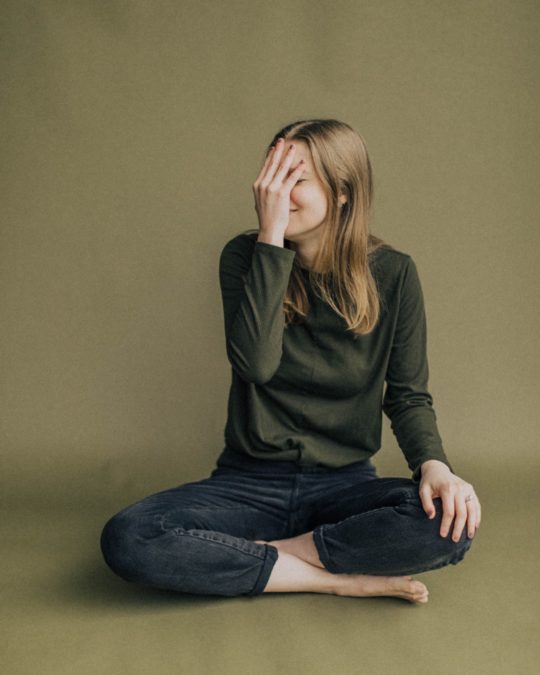I’m So Embarrassed
I’m 14, about to audition for a scholarship at the American School of Ballet. My mother and I had gotten up early and driven to Manhattan
from Massachusetts. There was more traffic than we expected and I’m nearly late as I rush into the dressing room to change into my leotard and tights. I walk quickly over to the studio and open the door. It closes behind me and I’m standing at the top of a stairway. I look down and see that the room is filled with dancers. My shoulders are raised up to my chin and my fingers are clenched as I fiddle with the waistband of my tights Although it isn’t her fault, I’m angry at my mother for making us late, ruining my chances of slipping into the studio early so I can be invisible and get a good spot in the room. Now I have to walk down the stairs in full view of close to forty
students and figure out how to eke out a place for myself at the crowded ballet barre.
I look straight ahead, trying to seem casual and confident. I take the first step off the landing, lose my footing and slide forward, falling loudly, step by step, down the flight of five stairs. Everyone stops fidgeting, pulling, bending, and stretching for a brief moment and stare at me until I land at the bottom. I’ve made my entrance into this competitive world not neatly, quietly, and inconspicuously like I had planned, but rather with a roar and a bang, a red face and a wounded body. When I get up and try to find a place at the barre, no one wants to make room for me. I push someone forward, she glares at me and she lets me in.
Embarrassing is too mild of a word for what I felt, but we all have our fair share of humiliating moments. I once went to a poetry circle where sixteen of us read our poetry aloud and offered what we
thought were supportive comments – except for one woman who tore everyone down. After each reading, she said something cruel and demeaning. I don’t know why the facilitator allowed it. Maybe she was preparing us for the inevitable rejections that every writer has to endure.
When it was my turn, I read my poem in a and looked up.
“That sounds like a Hallmark card,” Miss Shamer
commented.
I winced, it hurt, and I joined the other poets who couldn’t wait to give her back what she was slinging out. We continued around the circle, she continued to upset everyone and when it was her turn,
she got up and left.
These cruel criticisms leave their marks in our subconscious. Kids bully other kids until they get so broken down, they hide in the schoolyard, shamed, scared and unwilling to tell an adult how they’re being treated. A lot of us have PTSD from this kind of treatment at some time in our lives. Nothing evokes fear and paralysis like someone telling you you’re not good enough or you’re doing something wrong. But the way you choose to live and express yourself cannot be measured by what someone else thinks about you.
If you’re authentic on the page, other people will relate. When I was writing my book, “Memoirs of a Ghost,” I had a serious talk with myself. Was I willing to be vulnerable and write what really happened to me in my life? Or did I want to hold back and hide the feelings that embarrassed me? I decided to go for it and put it all out there.
When my book was published, a friend invited me to her book club so the women could ask me questions. I answered what they wanted to know and a woman raised her hand. “How did you find the courage to tell the truth about that awful love affair?” she asked.
“I figured if it happened to me,” I said, “it happened to a lot of other people.”
Every woman in the room looked down, probably remembering something deeply hurtful that they wanted to forget. But when we
find the courage to tell the truth, other people find the courage to join us. It’s a relief to know that we aren’t alone. When a woman comes forward to publicly report something violent, embarrassing or hurtful, other women come forward, too, because they finally have the support to admit what happened to them. I’ve seen that drumming up the courage to speak about something shameful, even something small, can free your mind and allow you to forgive yourself. The late Leonard Cohen, poet, singer/songwriter and student of Tibetan Buddhism, said, “It’s easy to display a wound, a proud scar of combat. It’s hard to show a pimple.”


Recent Comments